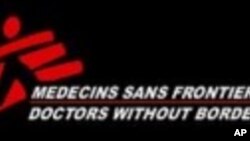<!-- IMAGE -->
A medical aid group says there are signs the international community is abandoning its support for an increase in AIDS treatment programs.
Doctors Without Borders, also known as MSF, says donor reaction to the global economic crisis is threatening funding and it warns of a "major funding deficit and a looming crisis."
There are already cases of patients being refused treatment and the rationing of care in some cases, the group says.
Possible Global Fund cutbacks
Sharonann Lynch is HIV policy advisor for Doctors Without Borders and the author of a new report on AIDS funding. From Johannesburg, she spoke about programs at risk, such as the Global Fund to Fight AIDS, TB and Malaria.
<!-- IMAGE -->
"The Global Fund has been a critical funder for country-level ARV (anti-retroviral drugs) programs, HIV/AIDS treatment programs, prevention programs and care programs – not just for HIV, but for TB and malaria as well," she says.
She says the fund has scheduled a meeting of the board of directors for next week in the Ethiopian capital, Addis Ababa.
"They're going to be voting on a resolution to suspend new funding rounds in 2010 due to the lack of funds. We've also seen that the Global Fund…has been forced to make substantial cuts in grants for proposals that have already been approved," she says.
Lynch says the potential funding shortfall comes at a time when AIDS programs are being scaled up to get more people on treatment.
Are rich nations backing off?
"Worldwide, there are four million people alive on ARVs now that otherwise would have died without access to treatment. There are six million more today in clinical need of treatment," she says.
<!-- IMAGE -->
In 2005, at the G8 summit in Gleneagles, Scotland, leaders pledged to support universal access to AIDS care, treatment and prevention for all those in need by 2010.
"Now what we see is a backing off," she says.
Doctors Without Borders is also critical of what they see as the "flat funding" for PEPFAR, the President's Emergency Plan for AIDS Relief.
Lynch disagrees with those who say the worldwide recession is a reason to scale back annual funding increases for HIV/AIDS programs.
"There is a financial crisis. That's for sure. But there is also very much a political one. I don't believe that the U.S...the Netherlands…the U.K…France are backing off from some of the commitments that they've made because of a financial crisis."
Instead, she says, the donors are "backing off…because it's expensive and because they think no one is watching."
Lynch challenges those who say HIV/AIDS programs have been overfunded and some of those funds should be given to fighting other diseases.
"It's not that HIV is overfunded. It's that global health overall is unfortunately underfunded, and that needs to be challenged," she says.
Doctors Without Borders says it's concerned about tradeoffs in health care.
"To save the life of a child from diarrhea just so that child will die of HIV/AIDS is not acceptable. And we cannot afford, nor can we tolerate for diseases to be pitted against each other…. It doesn't reflect reality as we're seeing on the ground," she says.
Expecting too much from Obama
Many AIDS-related groups and activists have been calling on U.S. President Barack Obama to fulfill his funding pledges made during the presidential campaign. But are they asking too much, considering the economic downturn?
<!-- IMAGE -->
"I don't see why, because frankly, when President Obama committed to the $50 billion over the court of five years, the economic recession was in full throes. So he went in eyes wide open," she says.
She says there are early signs of funding shortfalls, such as people being turned away from some AIDS clinics.
"We don't want to go back to the medical apartheid days of ten years ago, where MSF, with limited number of slots, had to decide with government who got to live and who got to die because simply there [were not] enough treatment slots.
PEPFAR officials say the Obama administration is pledging $6.6 billion to fight HIV/AIDS. Although this year's funding increase may be below past increases, the officials say the administration is committed to fighting the disease. They say, however, that the economic crisis does figure prominently in their funding decisions.
"PEPFAR has an incredible opportunity if the commitments [made by President Obama are met]. "PEPFAR has the opportunity to save six million lives and it shouldn't settle for three," she says.
PEPFAR officials say besides helping to get three million people on ARVS, the program supports more than 10 million people affected by the disease, including over four million orphans and vulnerable children. They say the program also "supports HIV counseling and testing for nearly 57 million people."
What's more, officials say the United States is the "largest single contributor to the global Fund to Fight AIDS, TB and Malaria," giving $3.5 billion since 2001.
<!-- IMAGE -->





